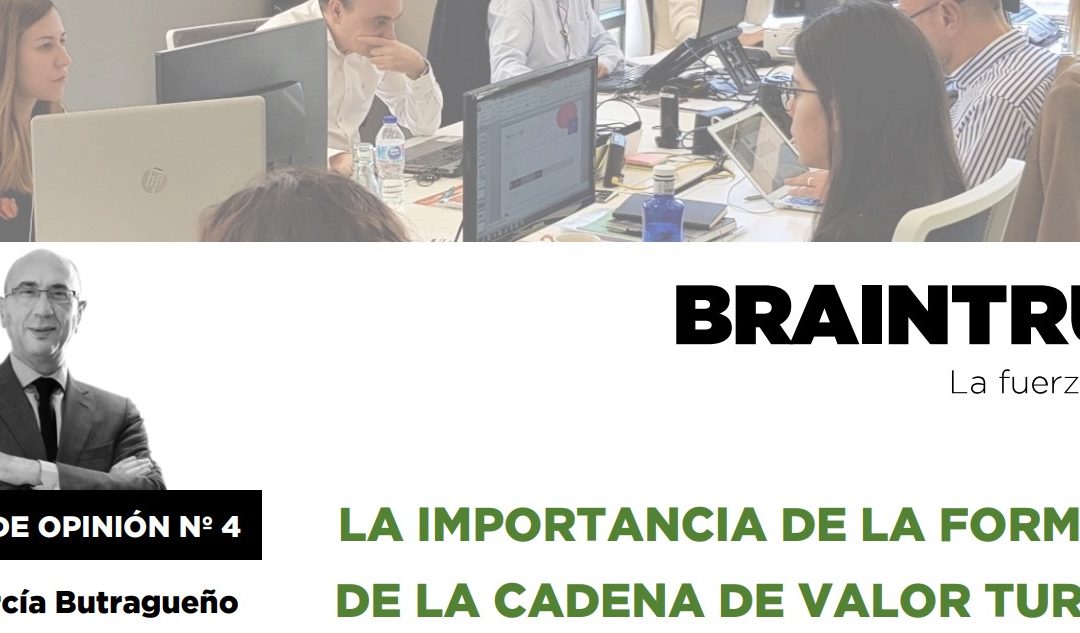Escribo esta cuarta tribuna de opinión en el (supuesto) pico álgido de la tercera ola de la COVID 19, si es que alguna vez superamos la segunda, y mantengo el espíritu optimista que ha caracterizado mis reflexiones, dado que como de toda crisis saldremos de ella, y convencido de que nos llevaremos muchos aprendizajes tanto en el terreno profesional como en el personal.
Nuestro Barómetro BRAINTRUST Leisure arroja datos para 2021 de un notable efecto rebote cuando pase la pandemia, fecha que todos ignoramos dado que no tenemos una bola de cristal, pero cuyo desenlace reside en la responsabilidad de cada uno de nosotros, y en la coordinación de las instituciones públicas para llegar a la inmunidad mínima de grupo donde se necesita la mayor rapidez y eficiencia de los esfuerzos sanitarios, cuyos profesionales nos siguen sorprendiendo por su resiliencia, sufrimiento y capacidad de entrega a los enfermos.
Ese efecto rebote, previsible por otro lado, estará cimentado sobre 2 grandes premisas, la necesidad de viajar tras meses de confinamientos, pseudoconfinamientos, auto confinamientos y confinamientos perimetrales -que dotan de literatura y riqueza a nuestro idioma – y la intensidad del ahorro forzado de los españoles ante la caída del consumo privado durante la pandemia.
La recuperación primero y el crecimiento después es un hecho irrefutable ante el que cabe esperar que las empresas turísticas y en especial los profesionales que componemos la industria estemos preparados para una nueva era del turismo, donde nada volverá a ser como antes, en una sociedad que definitivamente se transforma con los efectos de esta crisis global nunca vista antes.
Esta tercera ola de la pandemia ha hecho revisar las previsiones de crecimiento de todos los países, y en España nuestros estudios arrojan un crecimiento de la economía de un 5,9% para 2021 y un 7,2% para 2022, dejando para 2023 los niveles pre-crisis tal y como venimos anunciando hace algún tiempo. Eso siempre y cuando la vacuna se extienda rápidamente, no solamente en España, sino en los países de nuestro entorno con los cuales mantenemos grandes acuerdos comerciales y son los principales emisores de turistas, cumpliendo las previsiones de las autoridades europeas que esperan una vacunación próxima al 70% para el verano, recuperando así el turismo, motor de la economía española.
Un sector que debe seguir siendo un gran baluarte del modelo económico de nuestro país. Para ello, y antes de caer al abismo como manifiestan los empresarios turísticos, se necesitan ayudas públicas directas como sucede en otros países europeos, y recibir fondos del programa “Next Generation” que exigirá a nuestra industria una completa transformación y digitalización. En ese marco la economía verde va a tener un gran protagonismo, promoviendo en la actividad turística española un giro hacia un enfoque de sostenibilidad de todo el ecosistema, que espera de forma mayoritaria tanto el viajero español como extranjero según nuestras encuestas del Barómetro Internacional en BRAINTRUST.
Nos dirigimos por tanto a una nueva era en el consumo de los viajes, con un viajero más sensible al medio ambiente, más digitalizado y con múltiples opciones de producto turístico tanto a través del canal directo como de la intermediación, con procesos de principio a fin, integrados y digitales , a lo que se une el enfoque contactless provocado por la pandemia.
Con este panorama alentador por delante, estamos en un momento óptimo para reflexionar cómo será ese nuevo turismo y preparar a nuestros profesionales, que han dado sobrada prueba de adaptación a los cambios a lo largo del tiempo. Ese es el reto de las empresas turísticas más allá de la supervivencia – reto a mucho más corto plazo – saber capacitar a nuestras plantillas tanto en conocimientos como en habilidades acordes al futuro, condicionado todo ello por la llegada de nuevas generaciones viajeras con hábitos y comportamientos de consumo radicalmente distintas.
En 2020 la WTTC cifra en 140 millones los empleos destruidos, de los cuales espera que en 2021 se recuperen 100 millones, pero eso va a depender mucho de cómo seamos capaces de formar a los empleados del sector ante todos estos cambios que llegan y la actitud de los mismos ante un futuro incierto en lo económico pero predecible en el cambio de modelo. Sentarse a esperar que todo vuelva a ser como antes no es una opción y quien así lo haga perderá el tren del futuro. La responsabilidad de los Directores de RRHH es ímproba en los próximos meses y años.
Desde que era pequeño siempre le decía a mis padres que yo quería estudiar la carrera de turismo, que siempre consideraron una “maría”, porque en aquellos tiempos lo lógico y lo que estaba bien visto era estudiar carreras tradicionales para tener un
trabajo que entonces se consideraba de altura como médico, maestro o director de un banco. Con el tiempo logré que me dejaran estudiar lo que me apasionaba, y accedí al mundo laboral trabajando en hoteles, touroperadores, rent a car, agencias
de viajes, hasta llegar a la posición de Director General en American Express en el año 2001 en plena crisis de seguridad mundial, donde como equipo llevamos a la compañía a lo más alto del podio de la innovación, la creatividad, la solidaridad y la
diversidad, para después formarme y ejercer como consultor y coach en BRAINTRUST, función que ocupo en la actualidad, donde soy feliz tratando de hacer realidad mi verdadero propósito, ayudar a las empresas y a las personas a transformarse y que cumplan sus objetivos vitales.
No obstante pronto descubrí que la carrera de turismo, hoy evolucionada en gran medida, no era suficiente para ser un buen profesional en la industria turística por lo que tuve que complementar mis estudios con programas directivos y temarios complementarios, forjando las habilidades con las que cuento hoy en día, aunque tengo que decir que sigo formándome en diversas materias como Liderazgo, Digitalización, Gestión del Cambio, Análisis de Datos, Inteligencia Artificial, Economía Circular, Organizaciones Agile o Customer Experience entre otras.
Pongo mi propio ejemplo para intentar transmitir que todo profesional no debe quedarse satisfecho con lo que ha conseguido sino seguir formándose , el que se quede parado pensando que lo que sabe es suficiente, se quedará en la cuneta. “Más maestra es la adversidad que la prosperidad”.
Estos días trabajando en BRAINTRUST para varios destinos turísticos en sus planes estratégicos y en la formación de la cadena de valor, hemos definido las necesidades mínimas para el sector para un futuro post COVID, abarcando los siguientes aspectos generalistas que deberían ser completados con materias específicas de cada subsector:
• Reconexión emocional
• Inteligencia para la transformación
• Comprensión del mercado
• Valor del producto
• Habilidades comerciales
• Proceso de atención al cliente
• Experiencia de Cliente
• Omnicanalidad
• Eficiencia de los procesos
• Innovación como motor de la
transformación
• Digitalización
• Idiomas
• Trabajo en equipo
• Gestión del cambio
• Liderazgo
• Propósito organizativo
Como decía Alvin Toffler, frase que repito una y otra vez al comienzo de nuestros seminarios formativos de BRAINTRUST, “los analfabetos del siglo XXI no serán aquellos que no sepan leer y escribir, sino aquellos que no sepan aprender, desaprender y reaprender”. Nos guste o no, gran parte de las profesiones del futuro aún no se han inventado, y por tanto algunos conocimientos de hoy en día no servirían para mucho.
En el caso del turismo vamos a pasar de un fenómeno de masas a un modelo sostenible, donde parte de la experiencia con la que cuentan nuestros trabajadores será ya inservible, y habrá que instruirles en materias y temarios distintos. En nuestros tiempos la sociedad se transforma muy rápidamente, los cambios que antes tardaban años y décadas en materializarse ahora se hacen realidad en meses, como se ha demostrado en esta crisis actual de la COVID 19. No hay tiempo que perder en la transformación de la industria, y en este camino la colaboración público-privada de nuevo vuelve a ser fundamental.
No me gustaría cerrar esta tribuna de opinión sin llevar a escena la psicología positiva; la industria de los viajes está atravesando la mayor crisis de su historia, pero seguirá creciendo y seguirá siendo un gran motor de la economía mundial y por supuesto de la europea y española. Les corresponde a los políticos proteger a las empresas potenciando las ayudas públicas, es responsabilidad de los directivos de las compañías transformar nuestros negocios y modelos y salvaguardar los puestos de trabajo, y es obligación de todos afianzar y fortalecer la preparación de nuestros profesionales para garantizar el futuro de nuestro sector, siendo co-responsabilidad de cada individuo y de su empresa alcanzar niveles de capacitación alineados con las nuevas necesidades.
Los tiempos post COVID serán de una competencia feroz, ya que todos los destinos abordarán a los mismos viajeros tras la vacunación, especialmente las regiones donde el turismo es la principal forma de subsistencia, por ello fomentar la formación de toda la cadena de valor turística como uno de los ejes competitivos y ventajas diferenciales será clave para el éxito no sólo a corto plazo, sino a medio y largo plazo. Porque si la vacunación funciona, que funcionará, y los políticos ayudan, la recuperación es sólo cuestión de tiempo. Pongamos cada uno nuestro granito de arena, para seguir haciendo de nuestra industria en España la mejor de nuestro entorno. Aprender es un camino que nunca tiene fin.






